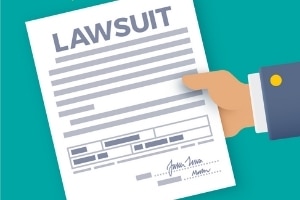“Legalese” is a difficult language to learn, and understanding the complex legal code is part of why law students spend so many years in school before they can try a case. It’s also why lawyers who are already bar-certified must take Continuing Legal Education classes as long as they are practicing!
At the Law Offices of Gary Bruce, we believe that everyone filing a personal injury lawsuit deserves to know exactly what’s happening from the day they contact us until the day their compensation check arrives. When you hire our firm, we’ll answer all your questions and provide frequent updates on the progress of your case. But in the meantime, learning these legal terms could help answer some of your initial questions.
Top Legal Terms to Know When Filing a Personal Injury Claim
Plaintiff/Defendant
Although these are two separate terms, for the purposes of this blog, we’ll discuss them together. In a personal injury case, these describe the two parties named in the lawsuit. The plaintiff is the person who is filing the lawsuit (the injury victim), and the defendant is the party who the lawsuit is filed against (the person or party accused of negligence).
Statute of Limitations
The statute of limitations is the time frame in which someone can be prosecuted or sued for something. If criminal charges or a lawsuit are brought after that deadline, the case will generally always be dismissed.
In general, personal injury claims, including car accidents and wrongful death claims, must be brought within two years of the date of the injury. This can vary in other states, but the time frame is two years in both Georgia and Alabama.
The rare exception is allowed through a process called “tolling,” which essentially pauses the start date of the two-year time frame if the injury victim is unable to file a lawsuit, such as if they were a minor when it occurred.
Duty of Care
Establishing that the at-fault party failed in their duty of care is extremely important to winning personal injury cases. Everyone–people, businesses, and so on–has a legal responsibility to take all reasonable actions to avoid harming others, and this is called their “duty of care.”
For example, drivers are supposed to avoid behaviors that could harm other drivers and pedestrians, such as speeding and driving while drunk or distracted. Business owners should make sure that their properties are safe to visit, and manufacturers need to make sure their products don’t harm people who use them.
When they fail to do so, they can be held legally liable for the harm that occurs.
Prayer for Relief
The purpose of any personal injury claim is to help injured victims recover their damages after an accident that wasn’t their fault. Damages can include:
- paychecks missed if they were unable to work while recovering from their injuries,
- money spent on medical bills,
- money spent repairing or replacing damaged personal property,
- and financial compensation equivalent to the physical pain and emotional distress they suffered.
When someone files a personal injury claim, their lawyer will submit an official complaint against the defendant which includes a section called a “prayer for relief” that lists how much money the injury victim is asking for in compensation for their damages.
Discovery
Discovery is the pre-trial phase of a personal injury claim where both sides (the injury victim’s legal team and the defendant’s legal team) collect evidence to justify why or why not the defendant is actually at-fault.
This will also be when witnesses and involved parties are deposed and give their official statements.
Discovery takes place whether or not the victim wants to settle out-of-court or proceed to trial, since the amount and quality of evidence found in discovery is usually what determines whether the defendant agrees to settle or wants to fight in court themselves.
Mediation
Mediation is an alternative way to resolve a personal injury claim aside from a trial, and may even be required before a judge will even agree to hear a trial. Rather than go to court, a neutral mediator (usually an unrelated attorney or retired judge), rather than a judge or jury, listens to the details of the case and tries to help both parties come to a settlement agreement. Unlike a judge, however, a mediator cannot order either party to agree to any decision.
Although the mediator does need to be paid for their services, mediation is still usually cheaper than the court fees for going to trial, and much faster as well.
Contingency Fee
Many personal injury law firms are paid by contingency fee, which means that instead of receiving an hourly rate, flat fee, or retainer, the lawyer is paid a set percentage of the settlement amount won. If the plaintiff does not win their case, the lawyer does not collect a fee, erasing any financial risk for people who need to hire a lawyer but can’t afford to pay one upfront.
Ready to Speak to an Attorney?
Your initial consultation is always free at the Law Offices of Gary Bruce, and you’re under no obligation to hire our firm simply because you spoke to a personal injury lawyer. When you hire our firm, we want it to be because you know that we can help you get the compensation you deserve.
Our phone lines are open 24/7, so don’t hesitate to contact us today about your potential injury claim.
